► GSe branding pays homage to old GSi badge
► Range will include performance PHEVs and EVs
► Vauxhall Astra and Grandland are first to be revealed
Vauxhall will re-introduce a sporty sub-brand to its range of cars. Titled GSe, both to point towards a range of electric cars and to hark back to the old GSi badge, we’ve had a sneak preview of two models on the Opel stand at the 2023 Brussels Motor Show.
The Opel Astra GSe and Grandland GSe will make it to the UK market largely untouched to be rebranded as Vauxhall, and set things in motion for the new badge. They’re both plug-in hybrid models, though the powertrains featured within aren’t new. They will sit at the top of its model line-ups in the same way Volkswagen uses its GTX branding on its electric cars.
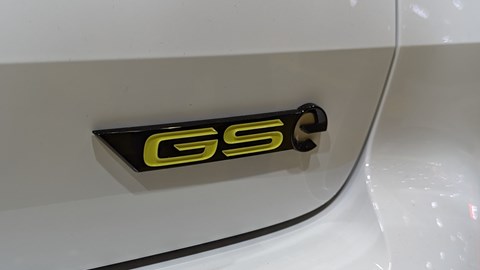
We’d expect to see fully electric cars join the GSe range soon – the Corsa Electric, Mokka Electric and upcoming Astra Electric would all be prime candidates for a sporting makeover.
The Astra GSe uses Stellantis’ familiar 222bhp PHEV powertrain, with a 1.6-litre petrol and electric motor. It’ll be available as a hatchback or the estate pictured here. It’s not purely an engine variant, either – the car rides 10mm lower than its non-GSe siblings, and features Koni adaptive dampers. It costs from 45,510 Euros in Germany.
There’s also the Grandland GSe, which will use the more powerful, four-wheel drive version of the hybrid powertrain for a total of 297bhp. It’ll cost 57,600 Euros in Germany.
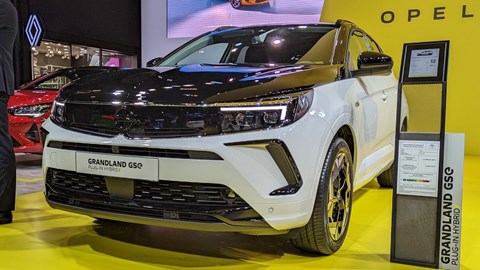
Both models enjoy a visual makeover too, with a new front bumper and rear splitter, unique wheel designs, GSe badging and exclusive Alcantara performance seats.
Hold tight for Vauxhall to confirm the UK line-up of GSe models.
Why create these new Vauxhall GSe models at all?
Vauxhall’s new GSe badge will add another dimension to its electrification strategy, with the sharper chassis and more aggressive looks hopefully attracting keen drivers back to the brand. Vauxhall has already said it will electrify every model in its range by 2024 and that it’ll only sell pure-electric cars from 2028 onwards (there’s more on this below) – so maintaining its fanbase with aspirational performance cars is vital during the transition period.
Vauxhall’s acting managing director, James Taylor [no, not that one]: ‘GSe will offer sports handling and looks combined with the performance and responsibility of electrified powertrains. Sitting atop the newly simplified Vauxhall range, the GSe name is both a nod to GSi performance models from our heritage as well being a complement to the GS versions in our line-up today.’
It’s also likely that the soon-to-be-revived pure-electric Vauxhall Manta (below) will feature the firm’s GSe badge, giving Vauxhall a direct competitor for the Volkswagen ID.5 GTX and the Kia EV6 GT. The iconic Manta name will return in 2025, fixed to the rear of a sporty crossover and powered by the firm’s next-generation electric technology.
Keep reading to learn more about the latest Vauxhall electric car plans.
Vauxhall -e models become Electric
Vauxhall has abandoned the previous -e naming scheme for its electric cars and will now simply brand them as Electric instead. The move is designed to make it easier for customers to understand that the cars in question are ‘full electric’ models.
This means:
The same change is applied to Vauxhall’s electric van models, and will also feature on the forthcoming Astra Electric, too.
Vauxhall’s electric ambitions: Manta EV crossover confirmed for 2025
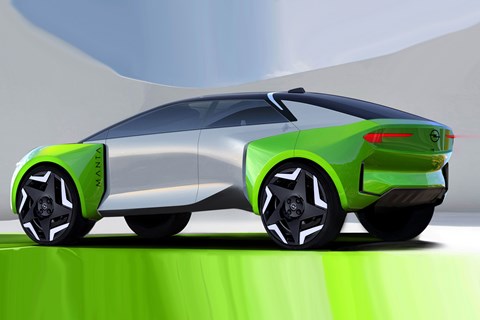
► Iconic Manta badge will return on crossover
► Crossland and Insignia to get EV successors
► Hydrogen fuel cell Vivaro-e van in trial phase
Vauxhall has confirmed that it’ll ditch the combustion engine for good in 2028 – every new car from the brand launched after that date will be powered by a pure-electric powertrain. The news forms part of Stellantis’s ‘Dare Forward 2030’ plan, which will see the group launch a broad range of new EVs and achieve carbon neutrality by 2038.
For Vauxhall (and Opel), that’s a big deal. But it’s not something the firm is incapable of. The brand has already launched a range of plug-in hybrid and pure-electric cars – and it’ll get a helping hand from its Stellantis sister brand Peugeot on the EV technology front.
Since the Dare Forward announcement, Vauxhall has confirmed plenty of details about its electrification plans – including a rough list of the models it’ll launch in the next six years. Keep reading for a rundown of everything we know so far, as well as some more information on the company’s plans for its Ellesmere Port factory.
Cut to the chase. What’s on the horizon?
More EVs than you can shake a Type 2 cable at. Most recently, Vauxhall confirmed the iconic Manta would return as a fully electric crossover in 2025. The decision was swayed by all the positive feedback the company received for the Manta GSe electric restomod.
On top of that, Vauxhall has now said that the next-generation versions of the Crossland and the Insignia will have battery-electric powertrains. The technology that underpins these cars will also be much more advanced than what the company offers today.
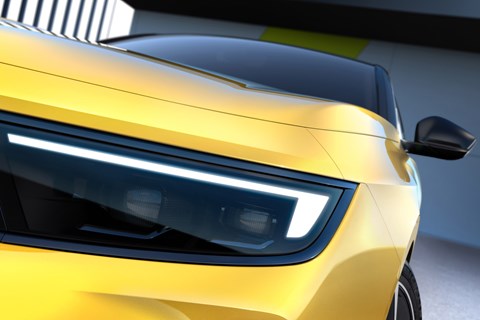
Vauxhall says that ‘in the near future,’ its EVs will have driving ranges of between 310 and 497 miles. The company’s charging technology will also get a shot in the arm – Vauxhall says its new EVs will offer ‘best-in-class’ rapid charging speeds of 20 miles per minute.
In 2023, we’ll also get a pure-electric version of the Astra. It’ll join the 222bhp plug-in hybrid model that’s already in the showrooms, and will be one the first cars based on the Stellantis group’s STLA Medium platform. The underpinnings are basically a rebranded, updated and electric-ready version of PSA’s ubiquitous EMP2 chassis.
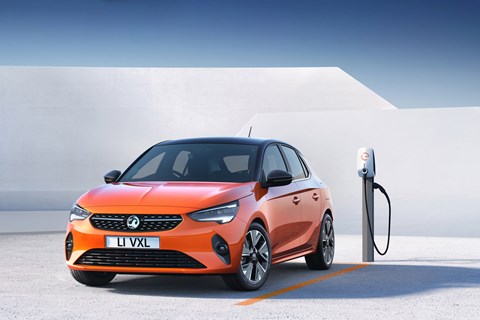
We’ve got more than just electric cars to look forward to, as Vauxhall is also investigating a hydrogen fuel cell-powered version of its Vivaro-e van. The project is already in its trial phase, with the first prototypes set to hit UK roads soon.
These will join Vauxhall’s existing range of electrified vehicles, which includes the pure-electric Corsa Electric and Mokka Electric, the plug-in hybrid Grandland SUV and the brand’s range of electric commercial vehicles – the Combo Electric, Vivaro Electric and Movano Electric.
Okay. But what’s going to power all these new EVs?
We’re glad you asked. Vauxhall recently signed a partnership with Total, Saft and Mercedes that was designed to promote the development of battery packs for the automotive industry and – most importantly – produce them at a scale that can keep up with increasing demand.
It’s called the Automotive Cells Company – and its efforts will culminate in a new gigafactory in Kaiserslautern, Germany (where Opel currently builds its engines) that will have an annual battery production capacity of up to 32GWh. Production is set to start in 2025.
What’s happening at Ellesmere Port?
It’s been a turbulent few years for the factory. Its future was left hanging in the balance after the Brexit referendum and the subsequent forming of the Stellantis supergroup – but things seem to have stabilised for the plant. At least in the short term, anyway.
Production of the Astra (which has been built at the Ellesmere Port since the first-generation model was introduced in the 1980s) has been moved abroad, so Stellantis decided to turn the plant into a production centre for its electric vans. We’re talking light commercial vehicles and people carriers here – the sort of stuff that keeps Britain’s businesses moving.
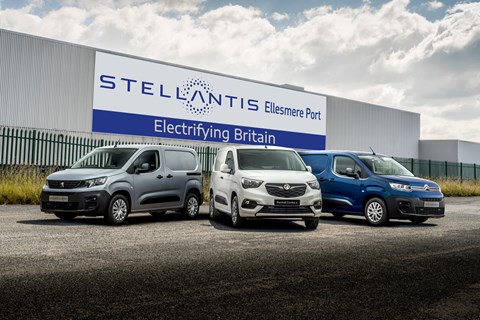
It wasn’t a cheap decision, though. Stellantis, with some help from the UK government, allocated £100 million to retool the facility so it could build the group’s electric vans. Still, we’d say that’s a worthwhile investment for the amount of jobs the decision will safeguard.
Stellantis boss, Carlos Tavares, said the decision ‘demonstrates [the company’s] commitment to the UK and Ellesmere Port,’ adding that ‘since 1903, Vauxhall has manufactured vehicles in Britain and we will continue to do so.’